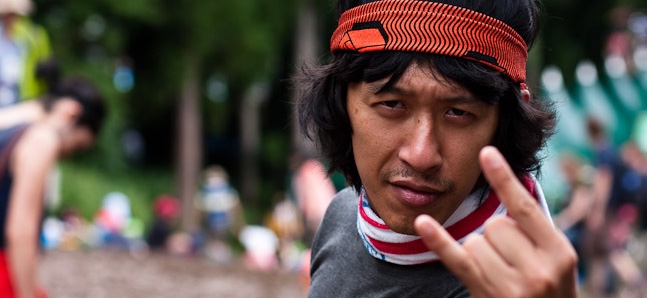Report: Fuji Rock Festival 2011
Politics and mud made this year's FRF a memorable one

Posted: Wed Aug 03 2011
Click here for Fuji Rock '11 photo galleries
Music? The chief preoccupations at this year's Fuji Rock Festival seemed to be rain and radiation. Punters arriving at Naeba, Niigata last Thursday found the place already sodden, with reports of far worse to come. In the end, the mountain location was partially shielded from the ferocious downpours that left three people dead elsewhere in the region, although the 17,000-odd campers had to contend with some unusually heavy rain during the night. And, yes, there was mud. Lots of it.
On a more serious note, this was also the most politically charged Fuji Rock to date. After festival founder Masahiro Hidaka lashed out at the nuclear industry in an interview with The Japan Times a few weeks ago, a rumour began to circulate online that performers had been forbidden from playing anti-nuclear songs, in line with a request from one of the event's major corporate sponsors.
While there wasn't much truth in that story, it was hard to shake the feeling that some of the overseas acts had been carefully drilled prior to their shows. Coldplay singer Chris Martin briefly broke ranks to comment about not believing the 'nuclear rumours', but for the most part the on-stage patter was kept to safer subjects like Nadeshiko Japan's recent World Cup victory, and whether or not everybody was having a good time.
By contrast, some of the Japanese acts took a firmer stance. To the likely dismay of his record company, rock singer Kazuyoshi Saito performed his anti-nuclear song 'Zutto Uso Datta' not once, but twice: both during his own set and when playing to an absolutely rammed Gypsy Avalon stage as part of Mannish Boys, his duo with drummer Tatsuya Nakamura. The latter was immediately followed by a Q&A session with the members of Yellow Magic Orchestra, in which Ryuichi Sakamoto directly accused the mainstream media of failing to report the truth. Soul Flower Union's 'Nuclear Power? No Thanks' t-shirts were a nice touch, too.
A few of the foreign visitors also rose to the occasion, albeit artists who you'd expect to sound off about this sort of thing. 'It's time for Japan to get angry,' proclaimed Asian Dub Foundation before launching into their final number. 'You must keep banging on the walls of your government until they tell you the truth.' Or, as Atari Teenage Riot's Alec Empire put it: 'We don't believe your fucking lies any more.'
All of this could get distracting, of course. When Time Out snapped some photos of a 'Say No to Nuclear Energy' flag, we were approached by a youngish Japanese guy who'd done volunteer work in some of the areas worst hit by the March 11 tsunami. 'People are starting to forget about the earthquake,' he said. 'You have to remind them.' A laudable sentiment, though the temblor that hit the festival site early on Sunday morning probably did a better job of jolting people's memories than we ever could.
Given all the events of the past few months, it wasn't surprising that attendance was lower this year, with a noticeable reduction too in the number of foreign faces. However, the patchy lineup probably didn't help much: Saturday night offered the grim choice of either Faces or Incubus on the two largest stages, and the preponderance of repeat performers including Asian Dub Foundation (already veterans of six Fuji Rocks before 2011), Mogwai (five) and The Chemical Brothers (five again) made it feel a little stale at times.
Thankfully, there was still plenty to get excited about. Much as Coldplay's stage gimmicks and the Chemicals' painstakingly conceived light show were impressive, the greatest spectacle of the fest must have been Congotronics vs Rockers, a sprawling, chaotic and insanely danceable supergroup that combined members of Kinshasa street bands with indie acts including Deerhoof. Other highlights included Manu Chao La Ventura's frenetic, crowd-pleasing punk-reggae, Atari Teenage Riot's pulverizing set on the final evening, and a muscular main stage performance by Battles, in which the group's three members were joined by virtual guest vocalists whose faces appeared on screens wedged between the guitar amps.
As ever, the Red Marquee peddled a constant stream of up-and-coming Western indie bands. The most impressive of these was The Naked and Famous, a New Zealand quintet who come on like a maximalist version of The XX, and already sound equipped for a far larger stage. Mancunians Wu Lyf also showed enormous promise, and it was hard to resist the allure of Warpaint, who in addition to being darn good were easily the best-looking band of the entire festival.
Others didn't fare so well. Without the overdriven production that made their album Crazy for You such a bracing listen, garage rock trio Best Coast sounded downright flaccid. The same complaint, alas, could be directed at post-rockers Mogwai, whose plodding set on the Green Stage was totally eclipsed by Envy's fiery turn in the Red Marquee immediately afterwards.
And what to make of Yellow Magic Orchestra? The reformed electro-pop group make little attempt to recreate the sound of their original albums, meaning that signature tune 'Rydeen' was virtually unrecognisable until halfway through, and the gig as a whole felt more suited to the concert hall than a main stage slot in front of a peak-time festival crowd. It wasn't a dud, by any stretch, but it did serve to revive a persistent thought: following the death of Kiyoshiro Imawano, are there any Japanese artists who could pull off a headlining slot at Fuji Rock?
And if so, can we have them instead of the Faces next time, please?
Tweets
- About Us |
- Work for Time Out |
- Send us info |
- Advertising |
- Mobile edition |
- Terms & Conditions |
- Privacy policy |
- Contact Us
Copyright © 2014 Time Out Tokyo










Add your comment